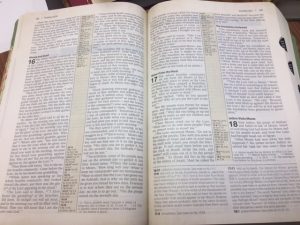
Sometimes I’m nonchalant towards God. I know you’re not supposed to admit things like this, but I am. The ancients feared God, the saints revered Him, and the prophets extolled Him. But me? I’ve heard the Gospel so many times it sometimes loses its wonder.
Let’s be clear: that’s not the Gospel’s fault; it’s entirely my own. I let the latest “it” thing and the newest Netflix drama everyone’s talking about and vacation plans catch my attention and district me from the One who should truly send my excitement through the roof and my tongue flapping on about it to my sister’s ex-college roommate’s best friend via social media.
But most of us just don’t find God that newsworthy. It’s good to sing to Him on Sundays and open the Word when someone preaches from it, but do we ever really let Him speak to us when we’re alone? I want Him to, but I don’t always act like it. I get to a place where talking to God seems as mundane as brushing my teeth: I do it because I’m supposed to, it’s good for my health, and because I don’t want to not do it. But I’m not eager to find the quiet place with Him.
What do you do when you find yourself here? (You do find yourself here, right? I can’t be the only one—just maybe the only one to admit it?) I look to God in the Old Testament. (Bet that’s not what you expected at all.) I look for Him in the Old Testament because He dealt with a stubborn, stiff-necked people who always turned their backs on him (sounds like me), and still He loved them (sounds like Him). Because time after time and chances again, He waited for His people to return to Him, to move close to Him, to honor Him. He delayed the consequences of their flagrant disregard for Him until the last possible moment. And because even when He did punish them for their wicked ways, His heart broke at the separation and He created their way to get back to Him.A lot of people will tell you the God of the Old Testament is harsh and wrathful, but don’t you believe it.

You’ve likely heard of a little thing called the ten plagues of Egypt, but did you know God spared the Israelites from most of them and that their freedom was gained during the darkest of nights (Ex. 7:14 – 12:42)?
The next generation of Israelites entered into the Promised Land out of style because during their punishment of four decades of wandering through the desert, their clothes and shoes didn’t wear out and their feet didn’t swell (Deut. 8:4-5; 29:5). (You’d think they would’ve been grateful for that.) God considers Jacob and his descendants “the apple of his eye” (Deut. 32:10).
After the Israelites had settled in “a land with large, flourishing cities you did not build, houses filled with all kinds of good things you did not provide, wells you did not dig, and vineyards and olive groves you did you not plant,” they disobeyed the law they’d sworn to follow. God allowed raiders to plunder their fortunes, but when they called to Him, He called up leaders to save them (Judges 2:16, 18). At one point, we’re even told “He could bear Israel’s misery no longer” (Judges 10:16b).
He’s our Kinsman-Redeemer (Leviticus, Ruth, & Isaiah), the cornerstone of all creation (Psalms), the bridegroom of His people (Song of Songs), and our witness, advocate, and intercessor at judgment (Job). And before all of that, He’s the breath of life and the Creator God who, at the first incident of sin and millennia in advance, established our way Home (Genesis).
I look to God in the Old Testament because it reminds me that He always has and will continue to be all of those things, even when it doesn’t feel like it here in this time and space in history, when the banality of my faith and my worship leave me indifferent. That’s where I find Him, waiting for me with patience and lovingkindness for His wayward child to become enamored of Him once again.



